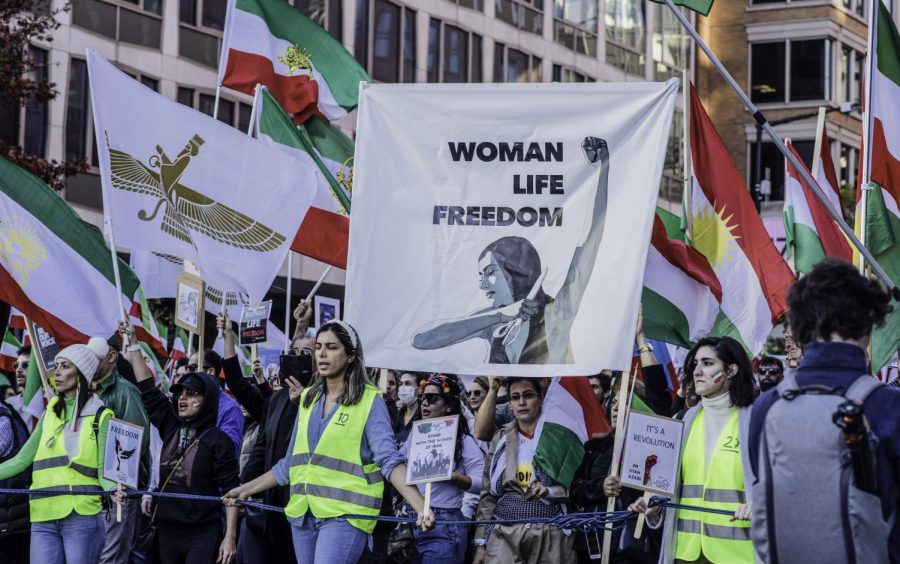Theocracy threatens women in Iran
Protesters march in solidarity with Iranian women on Oct. 29 in Washington, D.C.
November 22, 2022
As protests surrounding the death of Mahsa Amini continue to take place in Iran, Iranian lawmakers have recently called for stricter punishments for the protesters who have been arrested.
According to CNN, in a letter signed Nov. 8, 227 members of the Iranian parliament urged protesters to be given harsh punishment to “serve as a good lesson in the shortest possible time.”
While in police custody in Tehran on Sept. 16 Amini was detained due to allegedly violating Iran’s strict veiling laws, which forbid women from going out in public without wearing their hijab and punish the misuse of the headscarf, according to CNN. Amini, a 22-year-old Iranian native became the martyr for protests.
According to Amini’s brother, Kiarash, his sister was detained by the Guidance Patrol, which acts as “morality police’’ and enforces Islamic dress codes upon female citizens. Kiarash said his sister was forcibly taken into a police van according to Iranian news outlet, Iran Wire.
Officers proceeded to take Amini to a local police station to receive “re-education classes.”
Incidents such as Amini’s death continue in countries around the world, with more cases of discrimination, violence or death involving women.
According to Amnesty International, it’s common practice for Iranian law enforcement groups to proceed with arbitrary arrests and the use of force toward their citizens. However, the Iranian authorities denied their involvement in Amini’s death and said her death was brought on by a heart attack.
The morality police exerts its power to harass, terrorize and discriminate against Iranian citizens.
“Women, life, freedom.” These are the words that protesters chant as they demand their right to freedom in Iran and around the world. Iranian women have been oppressed through silence and violence, not by hiding under their headscarves.
As a sign of protest, Iranian women are cutting their hair and burning their hijabs publicly, while men take to the streets with their relatives in solidarity. Protesters post their videos on platforms such as Instagram and WhatsApp, which have been restricted by the Iranian government. People gathered at Amini’s funeral on Sept. 29 to mourn and protest. Iranians want discrimination and violence toward women to end and for the government and authorities to be held accountable.
Sheri Van Court, an ESOL professor at Brookhaven Campus, originally from Iran, said that Iran is one of the few Middle Eastern countries where women have been more liberal and independent. “Women in Iran do have a lot of rights,” Van Court said. “The majority of them are doctors, engineers, highly educated, and they can be what they want to be.”
Theocracy in Iran has led to strict rulings. Religions and their scriptures have different interpretations, and this time it seems the Iranian government has escalated to another level. Van Court said, in the Quran, Islam does not oblige women to wear hijabs or headscarves, instead, it suggests modest clothing when in public.
Many wear them by choice, while others express their individuality through their hair and clothing. “They are putting most of the effort on subduing women, because they want to save their image that they are a theocracy,” Van Court said. “It’s the Islamic Republic of Iran, therefore, women have to cover themselves.”
A government’s focus should not be on religion. Matters such as education, healthcare and security should be its primary focus. What the Iranian regime is doing is subduing its citizens into a government’s interpretation of Islam, and not allowing Iranians to live a free life. Relentlessly, protesters are taking to the streets against the government of the Iranian president, Ebrahim Raisi.
Theocratic governments are a threat to freedom and security for women, bullying them into silence and even death. During a critical time for Iran, President Raisi refused to speak to Christiane Amanpour, a CNN reporter, when she declined to wear the hijab for the interview. This only emphasizes the lack of responsiveness of Iranian authorities on the death of Amini.
The Iranian government, which has taken extreme measures against their people, used violence during protests, accounting for 233 deaths, most victims being women and children, according to the Human Rights Activists News Agency. “The government is worried that they’re losing their control [over] women,” Van Court said.
Iran has had similar protests during the 20th and 21st centuries, although they have not seen them to this magnitude. With protests surging across the world, everyone should be concerned, because cases such as Amini’s affect everyone.
The future of women is uncertain. As more protests are taking place in Iran and around the world, safety has been the primary concern.
It is an alarming time to be a woman, as more government regimes, such as the Iranian government, seem to abide by oppressing and discriminating laws. It is more than demanding the use of a headscarf, it is the violence and oppression imposed by the theocratic authorities that will only end with women’s freedom.



